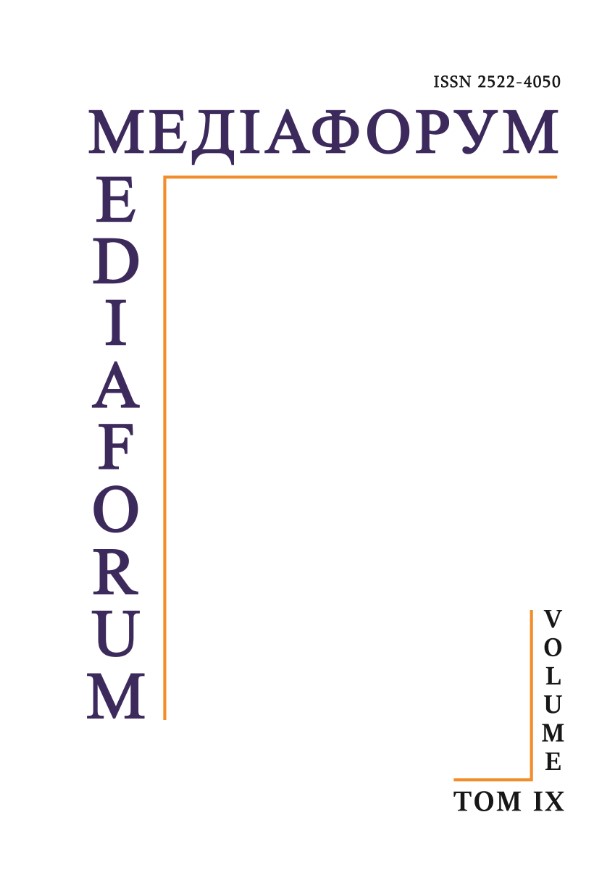EU’s Resilience in the Eastern Partnership Region vs Russia’s Hybrid Aggression
DOI:
https://doi.org/10.31861/mediaforum.2021.9.78-86Keywords:
European Union, Eastern Partnership, Ukraine, Russian Federation, aggressionAbstract
The article examines the issues of counteracting the hybrid aggression of the Russian Federation in the countries of the Eastern Partnership. It is stated that European Union has been implementing the Eastern Partnership policy for more than ten years. This implementation has been a resounding success for all, without exception, the six target states. Ukraine, the Republic of Moldova and Georgia have advanced much more in their European aspirations. However, this does not stop the Russian Federation from further positioning all the states that were once part of the USSR as a sphere of its ultimate influence. Russia is also producing rivalry with the EU for influencing all, without exception, the Eastern Partnership states and even the EU. An overview of academic research analyzing the resilience of the EU in the face of Russia in the context of its impact on the Eastern Partnership countries is set out in this article. Some approaches have been used to define the EU as a “normative power” and Russia’s controversial policy towards neighbouring countries.
The examination of the works described in the article concludes that the Russian Federation continues to regard neighbouring states as its sphere of influence, particularly Ukraine, Moldova, and Georgia. Moscow considers any attempt by a third party to interfere as an intrusion on its unique field of power. As can be observed from the investigated sources, Russia’s activities are scarcely diplomatic or focused on global democratic norms. In its Eastern Partnership strategy, the EU, on the other hand, utilizes values as a guideline. Simultaneously, Ukraine, the Republic of Moldova, and Georgia must demand immediate modifications to the Eastern Partnership policy. The potential of EU membership, in particular, must be appropriately explained by Brussels.
Downloads
References
Delcour, Laure. 2018. “Dealing with the Elephant in the Room: The EU, Its ‘Eastern Neighbourhood’ and Russia.” Contemporary Politics 24 (1): 14–29. https://doi.org/10.1080/13569775.2017.1408169.
Ene, Angela Mihaela. 2017. “Romania’s Role in the International Relations of EU for the Eastern Partnership.” Acta Universitatis Danubius. Relationes Internationales 10 (2). https://search.proquest.com/publiccontent/docview/2118387797?pq-origsite=primo.
Ene, Angela Mihaela. 2018. “Romania as a Factor for Consolidation of the ‘European Union’ Project versus Russia’s New Generation War in Europe.” Acta Universitatis Danubius. Relationes Internationales 11 (2): 96–103.
Giusti, Serena. 2016. “The Russian Federation’s Posture towards the European Neighbourhood Policy: A Neoclassical Realist Explanation.” In Theorizing the European Neighbourhood Policy, edited by Sieglinde Gstöhl and Simon Sieglinde, 61–82. Routledge.
Howorth, Jolyon. 2017. “‘Stability on the Borders’: The Ukraine Crisis and the EU’s Constrained Policy Towards the Eastern Neighbourhood.” JCMS: Journal of Common Market Studies 55 (1): 121–36. https://doi.org/10.1111/jcms.12448.
Kurečić, Petar. 2017. “The ‘New Cold Warriors’ and the ‘Pragmatics’: The Differences in Foreign Policy Attitudes towards Russia and the Eastern Partnership States among the NATO Member States from Central and South-Eastern Europe.” Croatian International Relations Review 23 (80): 61–96. https://doi.org/10.1515/cirr-2017-0021.
Kuzio, Taras. 2017. “Ukraine Between a Constrained EU and Assertive Russia.” JCMS: Journal of Common Market Studies 55 (1): 103–20. https://doi.org/10.1111/jcms.12447.
Kuzio, Taras, and Paul J. D’Anieri. 2018. The Sources of Russia’s Great Power Politics: Ukraine and the Challenge to the European Order. https://www.e-ir.info/publication/the-sources-of-russias-great-power-politics-ukraine-and-the-challenge-to-the-european-order/.
Manners, Ian. 2002. “Normative Power Europe: A Contradiction in Terms?” JCMS: Journal of Common Market Studies 40 (2): 235–58. https://doi.org/10.1111/1468-5965.00353.
Noutcheva, Gergana. 2018. “Whose Legitimacy? The EU and Russia in Contest for the Eastern Neighbourhood.” Democratization 25 (2): 312–30. https://doi.org/10.1080/13510347.2017.1363186.















